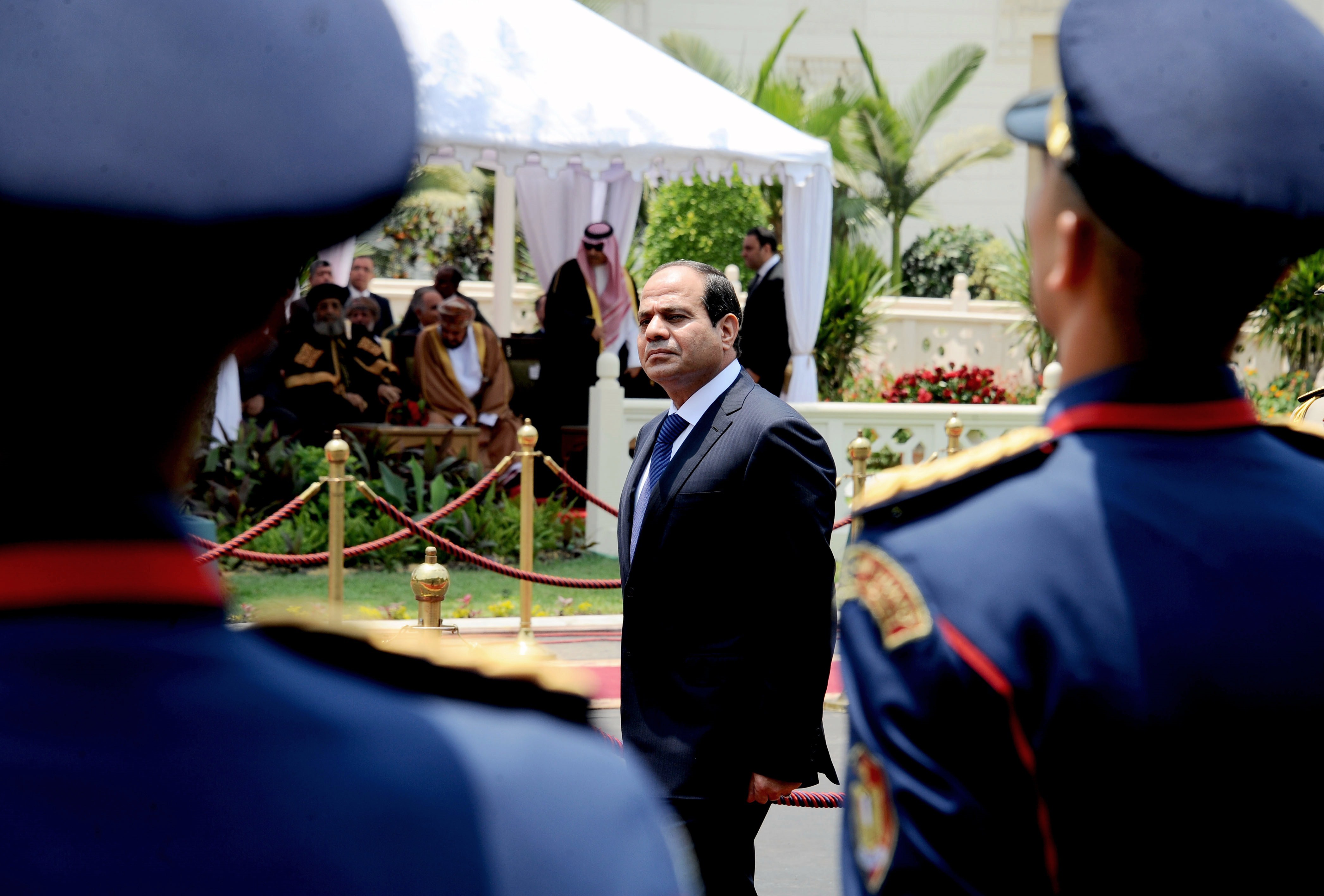
(AFP PHOTO / HO / EGYPTIAN PRESIDENCY)
The US issued the Country Reports on Terrorism for the year 2014 on Friday, outlining Egyptian law enforcement and security personnel achieved “limited successes in battling terrorists in its territory”.
The report identified two main terrorist groups in Egypt, namely Sinai-based Ansar Bayt Al-Maqdis (ABM – now known as “State of Sinai”) and Cairo’s Ajnad Misr. ABM had sworn allegiance to Islamic State in November, and there have been daily attacks in Sinai on security personnel.
The report also discussed the Muslim Brotherhood, designated a terrorist organisation as of December 2013. The Egyptian government and the High Administrative Court dissolved the FJP on 9 August 2014. On 30 October, the government also declared as illegal the National Alliance to Support Legitimacy, an informal political advocacy coalition led primarily by Muslim Brotherhood supporters.
“These designations have enabled widespread crackdown on the Muslim Brotherhood and its affiliated organisations, including mass arrests by the government and often severe sentences from the judiciary in mass trials,” the report stated.
Ousting former president Mohamed Morsi was the Zionists’ plan, according to the Muslim Brotherhood leader Wafaa El-Banna. She explained: “Zionists control 90% of world economy and thus politics. Pro-Zionists are ruling in the US. The terrorist report is one of the tools against the MB. However, they are playing people who are willing to die for freedom.”
President Abdel Fattah Al-Sisi has focused intently on counter-terrorism in Egypt, and has made counterterrorism issues one of the pillars of his first speech at the UN General Assembly in September 2014, the report mentioned.
“Under President Al-Sisi’s authority, the Egyptian military and security forces continued to aggressively pursue counterterrorism initiatives, particularly in Sinai. Some political opposition groups claim that the Egyptian government’s counterterrorism initiatives, while intended to target terrorist groups, have also had the effect of constraining their activities,” the report said.
It discussed legal measures undertaken against terrorism, with the report adding that Egypt also joined the Global Coalition to Counter IS, providing it with logistical and political support.
In light of countering the financing of terrorism, Egypt changed the name of Egypt’s Financial Intelligence Unit from the Money Laundering Combating Unit to the Money Laundering and Terrorism Financing Combating Unit.
Article 237 of the Egyptian constitution speculates that Egypt “commits to fighting all types and forms of terrorism and tracking its sources of funding within a specific time frame”.
“Egypt’s penal code includes an extensive counterterrorism legal framework, primarily under Part 2, Section 1, Article 86, which defines terrorism in expansive terms that include peaceful protests…Egyptian counterterrorism legislation has had an intimidating effect on NGO operations,” the report noted.
“It was a presidential decision with the aim of speeding the process of looking into judicial cases. But naming the circles as such gives the impression that those accused are in fact (pre-determinedly) terrorists. And the result was we neither saw speedy jurisdiction nor fair trials. All rulings are insensible,” said Halem Henish, a lawyer involved in several terrorism cases.
The November 2014 draft of the Terrorist Entities Law also defines a “terrorist entity” in broad terms, that human rights groups are concerned could be applied to civil society, the report said.
The Egyptian Ministry of Foreign Affairs and prominent Egyptian religious leaders, including Al-Azhar Grand Imam Sheikh Ahmed Al-Tayyeb and Grand Mufti of Egypt Shawki Allam, have repeatedly publicly condemned IS and its actions, while also making “unhelpful remarks” about the origins of IS, according to the report. It is not an uncommon view in Egypt that the US had a helping hand in IS’ formation.
The report referred to the collaboration between the Ministry of Interior’s National Security Sector the Egyptian General Intelligence Service, and the Egyptian armed forces. The Ministry of Islamic Endowments (Awqaf) is legally responsible for issuing guidance to which all imams throughout Egypt are required to adhere.
Borders were also included. Egypt continues to take actions to improve its border security measures, including destroying underground tunnels that connected Gaza and Sinai and is in the process of building an up-to-five kilometre buffer zone along the border with Gaza.



